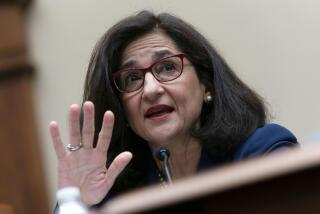Dean of Business School at USC Exits
- Share via
USC announced Thursday the abrupt resignation of its business dean, Yash Gupta, who came to the school after a nationwide search 19 months ago.
Gupta’s departure comes slightly more than two weeks after it was disclosed that he was a finalist for the presidency of the University of Arizona -- a position he didn’t win. It also followed a recent sharp drop in a ranking by the Financial Times of the overall MBA program at USC’s business school.
USC officials acknowledged that a mid-semester resignation by a top administrator was unusual and caught many on campus by surprise. However, in an interview, the university’s No. 2 administrator, Provost C.L. Max Nikias, said the departure “was really Yash’s decision” and that Gupta wasn’t forced out.
Nikias added that Gupta “worked very hard for the school. Very quickly, he put a new leadership team in the school in place, and he moved quickly to come out with a new strategy plan.”
Gupta, 54, who was the business school dean at the University of Washington before starting at USC in July 2004, issued no public statement and could not be reached for comment.
In a memo e-mailed to faculty and staff Wednesday, Nikias said the resignation was effective immediately. Nikias said he had been informed by Gupta “that his career path has brought him to the conclusion that he should resign from his current position,” although he would continue to hold a tenured position as a professor of information and operations management.
On Thursday, Nikias issued another memo to announce the appointment of Thomas Gilligan, a member of the faculty at USC’s Marshall School of Business since 1987, as interim dean.
Gilligan, 51, who was promoted to vice dean for undergraduate education upon Gupta’s arrival, said he would focus on implementing the “excellent ideas” that his predecessor brought to campus. They included initiatives to recruit faculty by offering such incentives as financial assistance for housing to ease the cost of moving to Southern California. Gilligan said another aim was to upgrade the curriculum and give it a more international focus.
He acknowledged that “most people within the Marshall School were surprised” by the resignation, but that Gupta “had put in a lot of very good programs and strategies that we’re all working on.”
Nikias brushed aside campus speculation that Gupta was pushed out because Nikias and USC President Steven B. Sample were angry that he was job hunting soon after arriving at USC.
The provost also said Gupta’s departure was not related to the decline in a Financial Times ranking published in January -- rating USC’s MBA program 54th among such programs worldwide, down from 37th a year earlier. Nikias said the Financial Times’ rankings did not take into account one of Marshall’s key strengths, namely, its flock of interdisciplinary programs with other schools on campus, including those providing ties to the entertainment and communications industries.
USC officials also pointed out that, in a separate ranking by the Wall Street Journal in September, Marshall landed at 10th place among national business schools in the U.S. The year before, it was ranked 23rd in a separate roster of regional programs.
As for raising money, another key role for a business dean, Nikias said that he didn’t know of Gupta bringing in any “major gift” exceeding $5 million. Marshall’s most recently reported endowment was $174 million, and it has booked $40 million in donations since Gupta’s arrival, although a spokesman said that some money probably was promised before Gupta took the job.
“When it comes to major gifts, it takes time,” Nikias said.
Marshall is USC’s second-largest school with 5,500 students, including 3,900 undergraduates.
More to Read
Sign up for Essential California
The most important California stories and recommendations in your inbox every morning.
You may occasionally receive promotional content from the Los Angeles Times.










